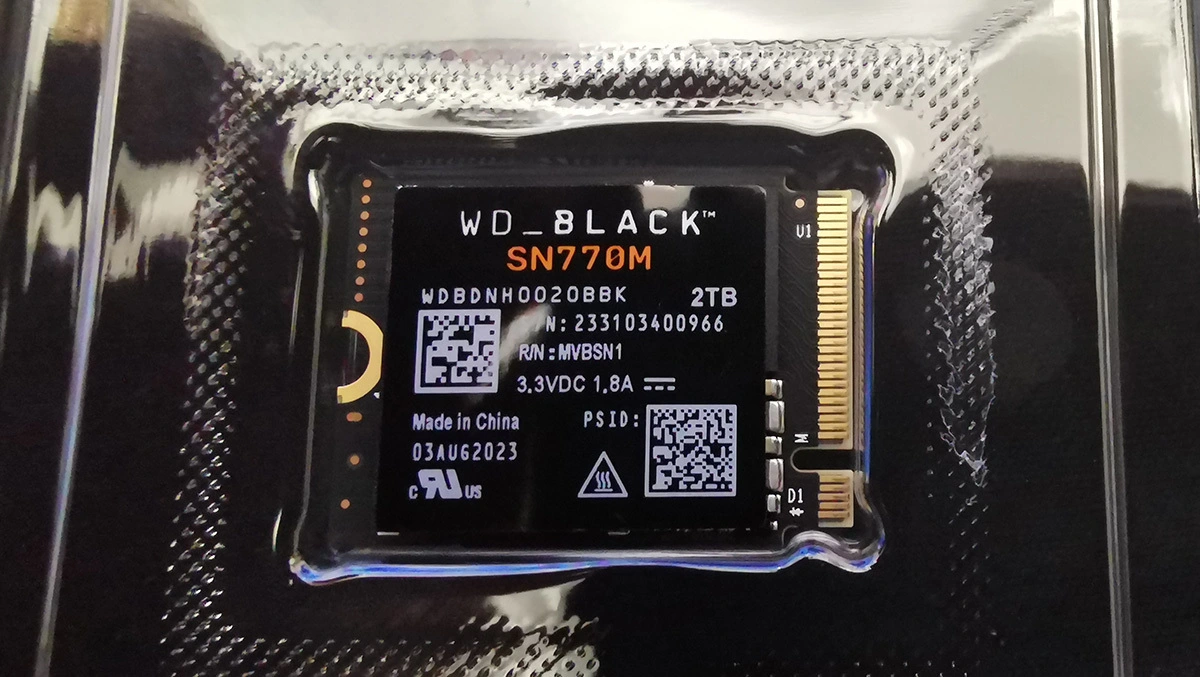
Designed for portable devices, the WD_Black SN770M M.2 2230 solid-state drive is not much bigger than a postage stamp. It's not just any old SSD either; it's a PCIe Gen4 x4 storage drive capable of data transfer speeds of up to 5150 MB/s. We were sent the two-terabyte version to test.
Western Digital has been in the storage drive business since the 1980s. The company produces drives for many different applications, from everyday use to mission-critical enterprise storage drives. The drives are all colour-coded according to the intended use. Western Digital's WD_Black drives are high-performance storage devices specifically designed for gaming. The WD_Black SN770M is the company's tiniest gaming drive.
NVMe M.2 SSDs have become an increasingly common storage solution. PCs and laptops tend to use the M.2 2280 form factor, in that they are 22mm wide and 80mm long- about the size of a stick of chewing gum. The tiny WD_Black SN770M is an M.2 2230 SSD. That means it's 22mm wide and only 30mm long. Whilst you can get an adapter for an M.2 2230 drive to use in a PC, the WD_Black SN770M is designed more for smaller devices like Surface Pros and handheld gaming PCs.
The Asus Rog Ally, handheld gaming PC, is one such smaller device that uses an M.2 2230 SSD. So, I reached out to my friends at Asus to see if they could lend me a ROG Ally, and they set one over. I didn't, however, tell them I was going to take it apart.
After less than a day with the Ally, the little device advised me that it was out of storage. All it took was installing Baldur's Gate 3, 3DMark, Helldivers 2, Forza Horizons 5, and part of Alan Wake 2 for all the fun to come grinding to a halt. I get it, the ROG Ally is a micro-PC more at home streaming games via Xbox Cloud Gaming than accommodating a vast PC gaming library. Even so, the device's standard 512GB of storage is a little tight.
This is where the WD_Black SN770M NVMe solid-state drive comes in. The boffins at Asus realised that there would be some gamers would quickly run out of storage, so they made it relatively easy to open and upgrade the Ally with a bigger M.2 2230 SSD.
Note I said "relatively easy". The ROG Ally only has one M.2 socket, so it's not a case of just adding another drive like you might in a desktop PC or laptop. The existing SSD must be replaced with the new one and the Windows operation system reinstalled.
Before commencing with the replacement, I thought I'd check the data transfer speeds of the Ally's existing 512GB Micron branded SSD using Crystal DiskMark. The factory-fitted drive scored a very reasonable max data transfer speed of 4228.04 MB/s.
The physical act of replacing the solid-state drive was not complex, as the ROG Ally's innards are pretty straightforward. There were five screws on the back of the device that need to be removed. By working a pry tool around the gap between the front and back of the device, the bottom panel is easily unclipped.
With the Ally's insides exposed, to be on the safe side, I first disconnected the battery. I found the factory-fitted SSD can be found under a flap of black plastic. I then unscrewed the fixing screw and carefully removed the old SDD. Inserting the new WD_Black drive was just as easy. All it needed was for the drive to be pushed into place and screwed back down. I covered the WD_Black drive with the black plastic flip, reconnected the battery, clipped the case back together and replaced the screws.
It's a ten-minute job.
Downloading and installing the operating system on the new WD_Black SN770M took a bit longer. The Ally must be booted to the BIOS screen and the download OS option selected. This is not so user-friendly, but there are plenty of guides and videos that can help.
With the operating system installed on the WD_Black, the Ally had space for almost four times the number of games. The improved functionality provided by the 2TB SSD over the factory-fitted 512GB drive cannot be overstated. With PC games using up upward to 125GB of storage space, installing a replacement SSD like the 2TB SN770M is pretty much essential. For me, it transformed the Ally from an interesting curio to a viable portable PC gaming platform.
Testing the Ally's data transfer speeds with the SN770M SSD yielded some very pleasing results. The drive achieved a maximum read speed of 5277.73 MB/s and a write speed of 4841.13 MB/s. The maximum speed was just over 1000MB/s faster than the factory SSD.
At between AU$350 and AU$440, the 2TB WD_Black SN770M is not cheap, but the SSD made a massive difference to the use of the Asus ROG Ally handheld gaming PC. The speed of the drive, which was above the speed stated on the box, is far more than the 270MB/s top speed I'd have got get using a MicroSD card in the Ally or the 4228.04 MB/s of the console's standard SSD. As well as fast access to my games, the 2TB storage allowed me to a sizable gaming library on the ROG Ally for gaming on the go.
